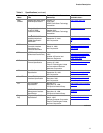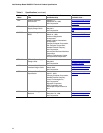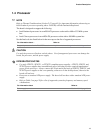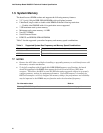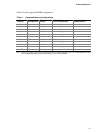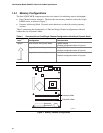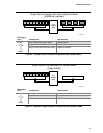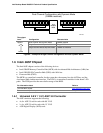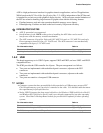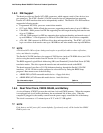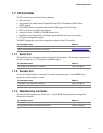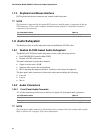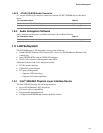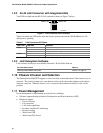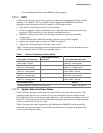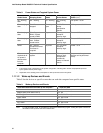
Product Description
25
AGP is a high-performance interface for graphics-intensive applications, such as 3D applications.
While based on the PCI Local Bus Specification, Rev. 2.2, AGP is independent of the PCI bus and
is intended for exclusive use with graphical display devices. AGP overcomes certain limitations of
the PCI bus related to handling large amounts of graphics data with the following features:
• Pipelined memory read and write operations that hide memory access latency
• Demultiplexing of address and data on the bus for nearly 100 percent efficiency
#
INTEGRATOR’S NOTES
• AGP 2x operation is not supported.
• Install memory in the DIMM sockets prior to installing the AGP video card to avoid
interference with the memory retention mechanism.
• The AGP connector is keyed for Universal 0.8 V AGP 3.0 cards or 1.5 V AGP 2.0 cards only.
Do not attempt to install a legacy 3.3 V AGP card. The AGP connector is not mechanically
compatible with legacy 3.3 V AGP cards.
For information about Refer to
The location of the AGP connector Figure 1, page 13
Obtaining the Accelerated Graphics Port Interface Specification Section 1.3, page 16
1.6.2 USB
The board supports up to six USB 2.0 ports, supports UHCI and EHCI, and uses UHCI- and EHCI-
compatible drivers.
The ICH5 provides the USB controller for all ports. The port arrangement is as follows:
• Two ports are implemented with stacked back panel connectors, adjacent to the PS/2
connectors
• Two ports are implemented with stacked back panel connectors, adjacent to the audio
connectors
• Two ports are routed to a front panel USB connector
✏
NOTES
• Computer systems that have an unshielded cable attached to a USB port may not meet FCC
Class B requirements, even if no device is attached to the cable. Use shielded cable that meets
the requirements for full-speed devices.
• Native USB 2.0 support has been tested with drivers for Windows* 2000 (with Service Pack 3)
and Windows XP (with Service Pack 1) and is not currently supported by any other operating
system. Check Intel’s Desktop Board website for possible driver updates for other operating
systems.
For information about Refer to
The location of the USB connectors on the back panel Figure 8, page 44
The location of the front panel USB connector Figure 12, page 52
The EHCI, front panel, UHCI, and USB specifications Section 1.3, page 16



